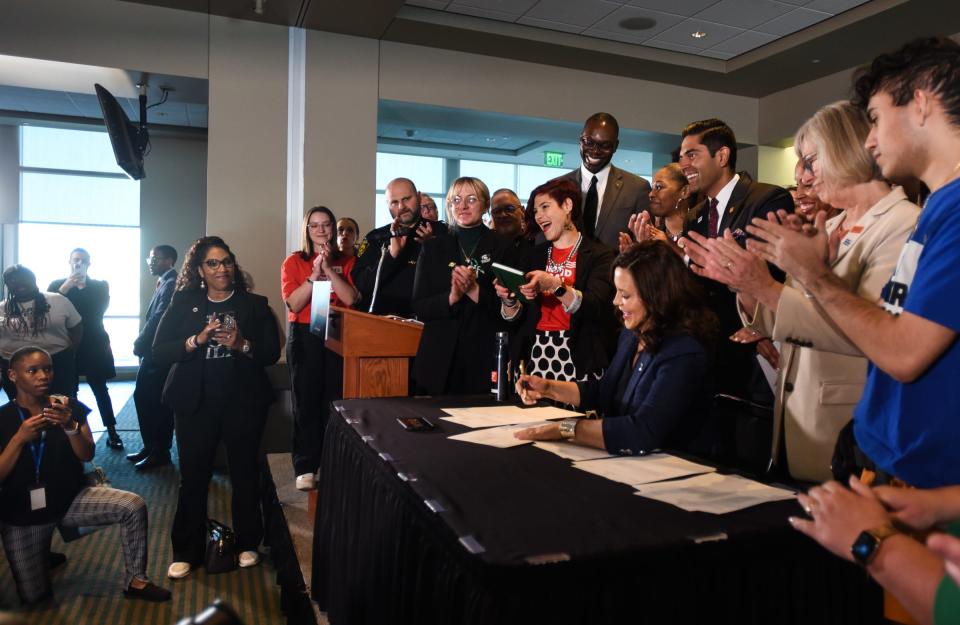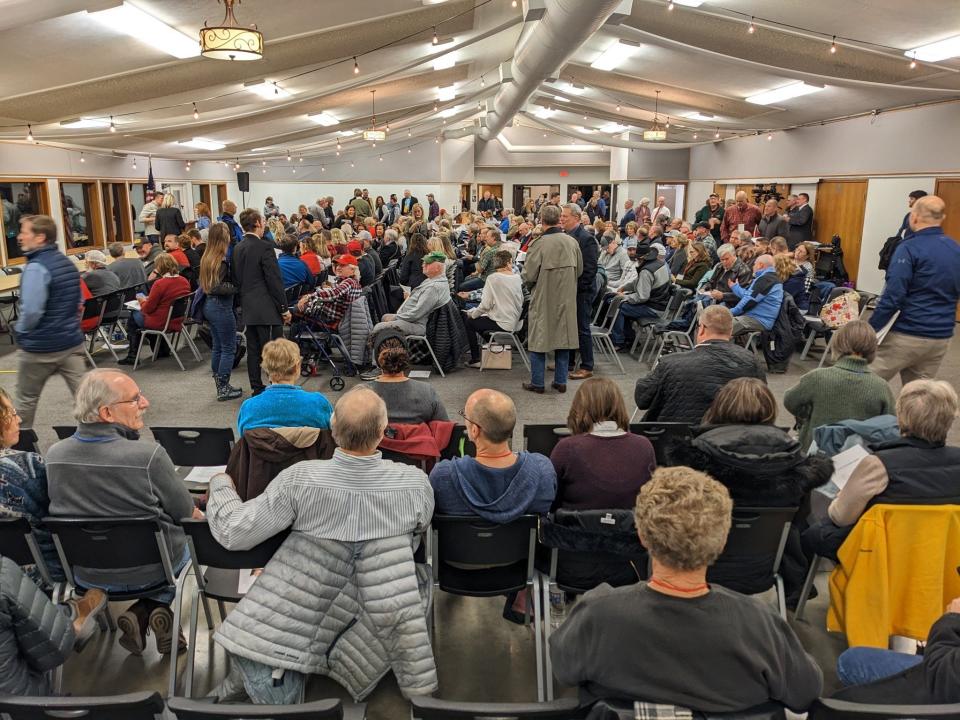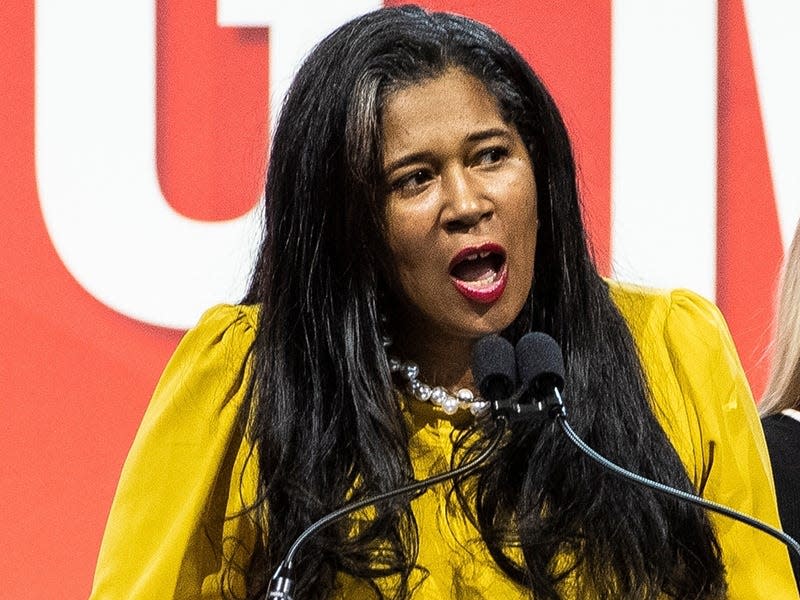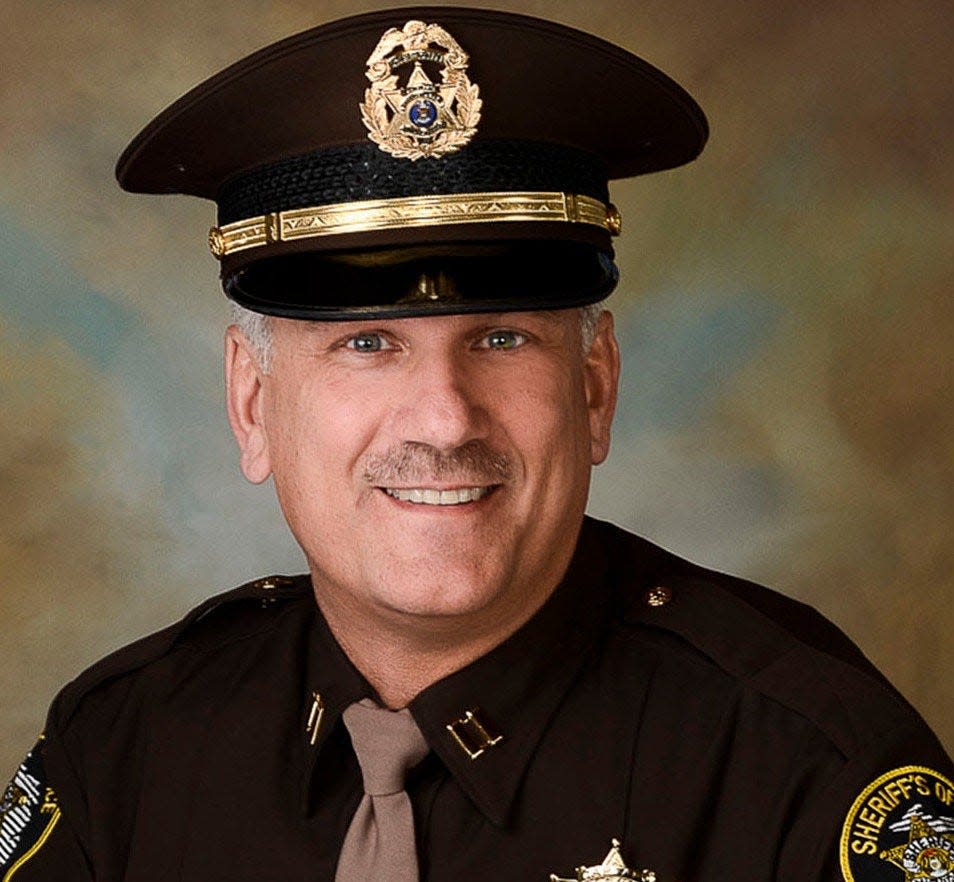What does gun-control legislation mean for counties under, considering 2A sanctuary status?
- Oops!Something went wrong.Please try again later.
OTTAWA COUNTY — An ultraconservative group last week appeared poised to make Ottawa County the latest Michigan region to become a so-called Second Amendment "sanctuary.” Now, the ink has barely dried on Gov. Gretchen Whitmer’s signature on new gun-control legislation.
What are 2A sanctuaries? And what does the new legislation mean for residents living in them?
Defining a sanctuary
Typically speaking, a 2A sanctuary is a jurisdiction that's adopted a resolution declaring gun control laws passed by a higher legislative body, such as the federal government or a state legislature, violate the constitution and won't be enforced in that jurisdiction.
An effort to declare Michigan counties as 2A sanctuaries began late in 2019 —a response to laws, sometimes referred to as “red flag” laws, adopted in 17 states and the District of Columbia. They enable law enforcement or family members to petition a judge to issue an extreme risk protection order against someone who may present a danger to themselves or others, removing their firearms.
In 2019, bills were introduced in the Republican-controlled Michigan House and Senate with similar language, but the measures stalled in committee.

That changed Thursday, April 13, after Whitmer signed into law several measures that further regulate the state’s gun control laws. A new state redistricting map and increasingly polarized politics helped Democrats take control of the state’s House and Senate this year — controlling both chambers for the first time since 1983.
The mass shooting at Michigan State University in February, which killed three students and injured five others, accelerated the timeline for lawmakers to adopt gun safety proposals already in the works.
Democrats targeted three main gun safety issues:
Safe storage laws: Safe storage laws create penalties for those who fail to securely store firearms that end up in the hands of minors.
Universal background checks: Universal background checks require a background check for all firearm purchases in Michigan. Currently, according to committee testimony, background checks aren't required for guns sold by non-licensed dealers, like individual gun owners, or for certain weapons.
Extreme risk protection orders, or red flag laws: Extreme risk protection orders, often referred to as "red flag laws," would allow courts to temporarily take firearms away from those deemed a risk to themselves or others.
More: Michigan Legislature opens debate on gun safety bills following MSU shooting
More: Whitmer expands background checks, enacts safe storage with gun safety bills
On Thursday, Whitmer signed House Bill 4138 and House Bill 4142 at MSU's campus just two months after the shooting. The former will expand the background check requirement to all firearm purchases; the latter amends the state's penal code to reflect the change.
Whitmer also signed Senate Bill 79 requiring gun owners to store their firearms in a locked container or use a locking device if they have a child in the house or take their gun somewhere a child could gain access to it. Senate Bill 80 signed by Whitmer updates the state's criminal code with the penalties for those who fail to safely store their firearms.
If a child injures themselves or someone else with an unlocked firearm, the gun owner would be guilty of a felony punishable by up to five years' imprisonment and/or a $5,000 fine. If the minor kills themselves or someone else, the individual who failed to secure or lock their firearm would be guilty of a felony punishable by up to 15 years' imprisonment and/or a $10,000 fine.
The bills passed on a party-line vote.
"Today we're taking common sense gun action to reduce violence and save lives," Whitmer said at the bill-signing ceremony. "Gun violence is a scourge that is unique to this country and that's why we're taking action."
In addition to the bills she signed, Whitmer repeated her call for lawmakers to send legislation to create a so-called "red flag law" her way.
"All of these initiatives are supported by a majority of Michiganders," she said.
Hours later, the Michigan House approved a series of bills to enact such a law. The two chambers must agree on the final versions of the bills before they can go to Whitmer for her signature.
Which counties have 'sanctuary' status?
In West Michigan, Ottawa would join neighboring Allegan County, which adopted a resolution on “sanctuary” status in 2020. More than 50 of the state's 83 counties have adopted resolutions to declare themselves “sanctuary” counties or to reaffirm their support for constitutional rights.
But the issue is complicated, even when addressed in rural, primarily conservative, areas of the state.
In Northern Michigan’s Emmet County, a “sanctuary” county resolution was considered in 2020, but was ultimately watered down to reaffirm the board's support for the constitution.
The county’s counsel, Bob Engel, warned the board — all Republicans — over his concerns on the enforceability of a “sanctuary” community.
“In speaking with the sheriff and the prosecuting attorney, they are not in favor of the language (presented by Second Amendment activists),” Engel wrote in a county memo. “They acknowledge that they have taken their constitutional oath required of all elected officials to uphold the constitutions and laws of the United States in all aspects, not just the Second Amendment.”
Engel suggested the measure could be seen as an overreach into the realms of the sheriff’s and prosecutor’s offices — elected officials over whom the board of commissioners have no legal authority.
In Eastern Michigan’s St. Clair County, the board approved a resolution in 2020, but nixed the word “sanctuary” in the final wording. The move prompted outcry from gun rights supporters, calling the measure “worthless.”
In Southern Michigan’s Lenawee County, the board in 2020 approved a resolution supporting the Bill of Rights, rather than a measure specific to the Second Amendment.
Near Grand Rapids, the Kent County GOP has approached its board of commissioners, asking them to approve a resolution — a similar request is pending in Ottawa.
“In the wake of unconstitutional gun-grabbing legislation by the Democrat-controlled majority in Lansing, the Kent County Republican Party resoundingly passed a resolution on Monday evening demanding the (Second Amendment) rights of Kent County voters be protected,” the Kent County GOP posted on social media Feb. 28.
In the wake of unconstitutional gun-grabbing legislation by the Democrat-controlled majority in Lansing, The Kent County Republican Party resoundingly passed a resolution on Monday evening demanding the 2nd amendment rights of Kent County voters be protected. pic.twitter.com/fiClQXVQpx
— Kent County Republican Party (@kentgop) February 28, 2023
The Kent County Commission has yet to take up the measure publicly, but it’s unlikely to happen there, Chair Stan Stek told Bridge Magazine.
Stek, a Republican, said the county has a rule barring commissioners from adopting resolutions “such as declaring the county to be a sanctuary county.” The rule says the board cannot pass resolutions “not directly within the authority and jurisdiction of the county and the board of commissioners” or “for any non-binding statements on policy matters.”
Ottawa County had a similar rule in place until this week.

What’s happening in Ottawa County?
The Ottawa County Board of Commissioners is now under the control of Ottawa Impact, a political group created in 2020 in response to anger over the county’s COVID-19 mitigation mandates.
Its founders, Board Chair Joe Moss and Board Vice Chair Sylvia Rhodea, were unsuccessful in suing the previous board of commissioners and the county's former health officer.
In response, they targeted seats on the board in 2022, recruiting like-minded candidates who agreed “traditional Republicans” weren’t enforcing true conservative policies. They successfully defeated enough incumbents in the August primary to secure a majority on the 11-member board.
The OI-led board wasted no time at its inaugural meeting Jan. 3 enacting several controversial changes, including:
Firing former administrator John Shay and corporate legal counsel Doug Van Essen
Attempting to demote the new county health officer
Shuttering the county’s Diversity, Equity and Inclusion Department
Changing the county’s motto from “Where You Belong” to “Where Freedom Rings”
More: Second lawsuit against Ottawa Impact-led commission targets decisions made Jan. 3
More: Judge to consider whether Ottawa County health officer was properly appointed
The decisions from that meeting have resulted in two pending lawsuits, an investigation by the Michigan Attorney General's Office and at least one Ottawa Impact member publicly splitting from the group — all within the new board's first three months in office.
Meanwhile, turmoil was already playing out within the Ottawa County and state GOP organizations, as the party continues to grapple with how to move forward in the post-Donald Trump era. Ultimately, the party’s ultraconservative members were successful in ascending to leadership positions, forcing many traditional, moderate Republicans out.

The county party was forced to redo its annual convention — where its executive committee is selected — after some of the GOP delegates sued the organization in December, claiming the first convention didn't follow the group's bylaws.
At the second go-round of the event on Jan. 16, Joel Studebaker was selected to lead the party for 2023, but he didn’t remain in the position long. During the February state convention, Moss nominated Kristina Karamo to chair the state party. Shortly thereafter, Studebaker left for a chief of staff position with the state GOP.
Karamo, the unsuccessful Michigan Secretary of State candidate who lost by 14 points to Democratic incumbent Jocelyn Benson in 2022, is known for her numerous conspiracy theories — including that Beyoncé was secretly recruiting Black Americans to paganism through her music; that “demonic possession is real” and transferred via “intimate relationships”; and that acceptance of gay and transgender Americans will lead to the acceptance of pedophilia.

She found herself in a new controversy just a few weeks later when the MIGOP’s Twitter account posted a photograph of Holocaust victims, likening it to Democrats’ restrictive gun proposals.
🚨🚨🚨
WATCH: Anti-Semitism courses through the veins of Kristina Karamo, Ottawa Impact's leader Joe Moss, and the Michigan Republican Party.
Christian nationalism is now the GOP brand.
We must stand up against this hatred in West Michigan and across the US.#OttawaCBoC #MIPol pic.twitter.com/br6oJMuEJz— Joe F Spaulding🦉 (@beyond_process) March 25, 2023
Karamo, a proud anti-vaxxer and 2020 election denier, defended the post and said, “We will not be silent as the Democratic Party, the party who fought to enslave Black Americans, and currently fights to murder unborn children, attempt to disarm us."
— Kristina Karamo (@KristinaKaramo) March 22, 2023
In Ottawa County, the local GOP replaced Studebaker with Brenden Muir, a newcomer to West Michigan.
Is a 2A resolution in the offing?
A member of the Ottawa County GOP appeared before the board of commissioners during public comment Feb. 28, saying the group had passed an internal resolution asking the board, prosecutor and sheriff to adopt the “sanctuary” designation for citizens’ gun rights.
He's currently reading a resolution (not before the board) that all involved declare their allegiance to "the second amendment rights or Ottawa County." (*There are no pending threats to these rights locally or statewide.)
— Sarah Leach ☮️ (@SentinelLeach) February 28, 2023
The measure says elected officials should “do everything in their power to defend the Second Amendment rights of the citizens of Ottawa County from any and all infringements.”
The commissioners didn't respond to the proposal, but internal moves since then indicate the intention of adopting the resolution.
The county board last week voted to rescind a 2021 policy that said the group “exercises limited governmental power” and should “only entertain substantive resolutions that pertain to the specific administrative or legislative authority” given to the board by state statute.
It was adopted at a time when residents asked commissioners to adopt policies and resolutions about issues such as mask mandates and COVID-19 vaccinations — in addition to requests to adopt a pro-Second Amendment stance.
Moss has indicated that adopting the county GOP resolution might be in the works, saying in April: “I think it’s great that the board also be able to use their voice on important issues, whether it’s (the) Second Amendment or parental rights or constitution or whatever the board might take up.”
Commissioner Jacob Bonnema asked Ottawa County Prosecutor Lee Fisher about the possibility of a sanctuary county resolution after Fisher gave his annual report April 11. Fisher said it would be inappropriate for him to give an opinion, but said it’s his duty to review violations of the law, whatever the law might be.
More: Ottawa County could be nearing action on Second Amendment sanctuary
More: Ottawa County board adopts hands-off policy for issues unrelated to county business
“I believe I was sent a proposed resolution for my perusal and commentary,” Fisher said. “I don’t believe it’s appropriate for me as the county prosecutor to publicly support, or not support, any type of resolution, any type of political statement, which the resolution was in my opinion.
“If there’s violations of the gun laws, whatever they may turn out to be … I have to objectively and fairly review those complaints and those investigations to decide if somebody’s going to be charged with violating the law or not. I don't think it’s appropriate for me to come out ahead of time and state my position on this, one way or the other, given my unique position in the criminal justice system.”
Behind the scenes, Fisher communicated to party leaders a similar sentiment.
“As a gun owner myself, I do believe that the right to bear arms enumerated in the Second Amendment is extremely important,” Fisher wrote in a March 2 email provided to The Sentinel. “When I took my oath of office, I swore to support and defend the constitution. … However, I do not believe it is appropriate for me, in my position a(s) prosecuting attorney, to publicly support any political resolution that may be perceived to affect my ethical responsibility to make fair, unbiased, and objective decisions to prosecute, or not prosecute, future cases that may come before me.”
Fisher’s statements did not impress some leaders.
Despite his current MIGOP role, Studebaker responded to Fisher on April 11 — hours after his public statements before the board.
“The current climate of our state requires bold actions, including resolutions, to remind everyone of our constitutional tenets and principles,” Studebake wrote. “A constitutional resolution is not merely a political resolution. Perception is a political concern, not an ethical concern.
"Ethics and principle should be top priority, regardless of the political perception of any specific prosecutorial decision. As an elected Republican, you are part of the party of the constitution, of principle, of ethics. When you stand on the constitution, on principle, on ethics, you can rest assured that 'We The People' and the Republican Party will have your back.”

Studebaker went on to urge Fisher to “reconsider” his position.
“I believe the people of Ottawa County and our Republican Party will move forward with full alignment and resolve, both inherently and boldly, as a county that abides by the constitution as the highest authority in the hierarchy of law,” Studebaker wrote.
Studebaker sent the email to the personal email accounts of the county board’s Republican members; Third District Commissioner Doug Zylstra, the board’s lone Democrat, was not included in the communication.
Is a ‘sanctuary county’ designation legally binding?
In short, no.
The Second Amendment, ratified in 1791, is one of 10 amendments that form the Bill of Rights.
When elected officials take office, they swear to uphold the state and U.S. constitutions, which includes the Bill of Rights, meaning reaffirming a commitment to the Second Amendment specifically is redundant.
In addition, Michigan laws governing the authority of county commissions state specifically that county boards cannot adopt an ordinance that prohibits gun regulations from the state.
Act 156 of 1851 states: "A county board of commissioners, at a lawfully held meeting, may … pass ordinances that relate to county affairs and do not contravene the general laws of this state or interfere with the local affairs of a township, city, or village within the limits of the county.”
An ordinance is a term typically used to refer to a "local law,” whereas a "resolution" is less formal and, generally speaking, is an expression of the opinion or mind of the official body. In simple terms, resolutions are often limited to expressions of opinion while ordinances create permanent rules of conduct or government.
The resolutions are not legally binding because county commissioners don’t have the legal authority to direct sheriffs, prosecutors or judges on what laws to enforce. The resolutions are mostly intended to “send a message” to lawmakers that further restrictions on gun control are not welcome.
Subscribe: Get all your breaking news and unlimited access to our local coverage
The idea is similar to the constitutional sheriff movement, which holds that local authorities, not the state, are the primary arbiters of most law enforcement decisions. Conservative sheriffs of similar views refused to enforce the governor’s COVID-19 executive orders in spring 2020, well before the state’s Supreme Court ruled she overstepped her authority.
Southwest Michigan’s Cass County approved a resolution last month instructing its sheriff not to enforce the newly minted laws, drawing a rebuke from the local sheriff to “stay in your lane.”
“I support the resolution as far as supporting the laws,” Sheriff Richard Behnke told his board March 2. “I do not support the fact that you’re trying to run my office and trying to tell me what to do. I feel that is against the law, and we will take full advantage doing our jobs the proper way.”

Ottawa County Sheriff Steve Kempker has not publicly given his stance on the issue, but two sources confirmed to The Sentinel that Kempker has said privately he will continue to fulfill the lawful duties of his position.
According to the non-partisan Gun Violence Archive, there were over 44,000 deaths related to gun violence in the U.S. in 2022, including 646 in mass shootings. As of mid-April, the Gun Violence Archive has counted at least 145 mass shootings in the United States this year.
Members of Ottawa Impact have never responded to The Sentinel's requests for comment.
— Sarah Leach is executive editor of The Holland Sentinel. Contact her at sarah.leach@hollandsentinel.com. Follow her on Twitter @SentinelLeach.
This article originally appeared on The Holland Sentinel: What does gun-control legislation mean for 2A sanctuary counties?

